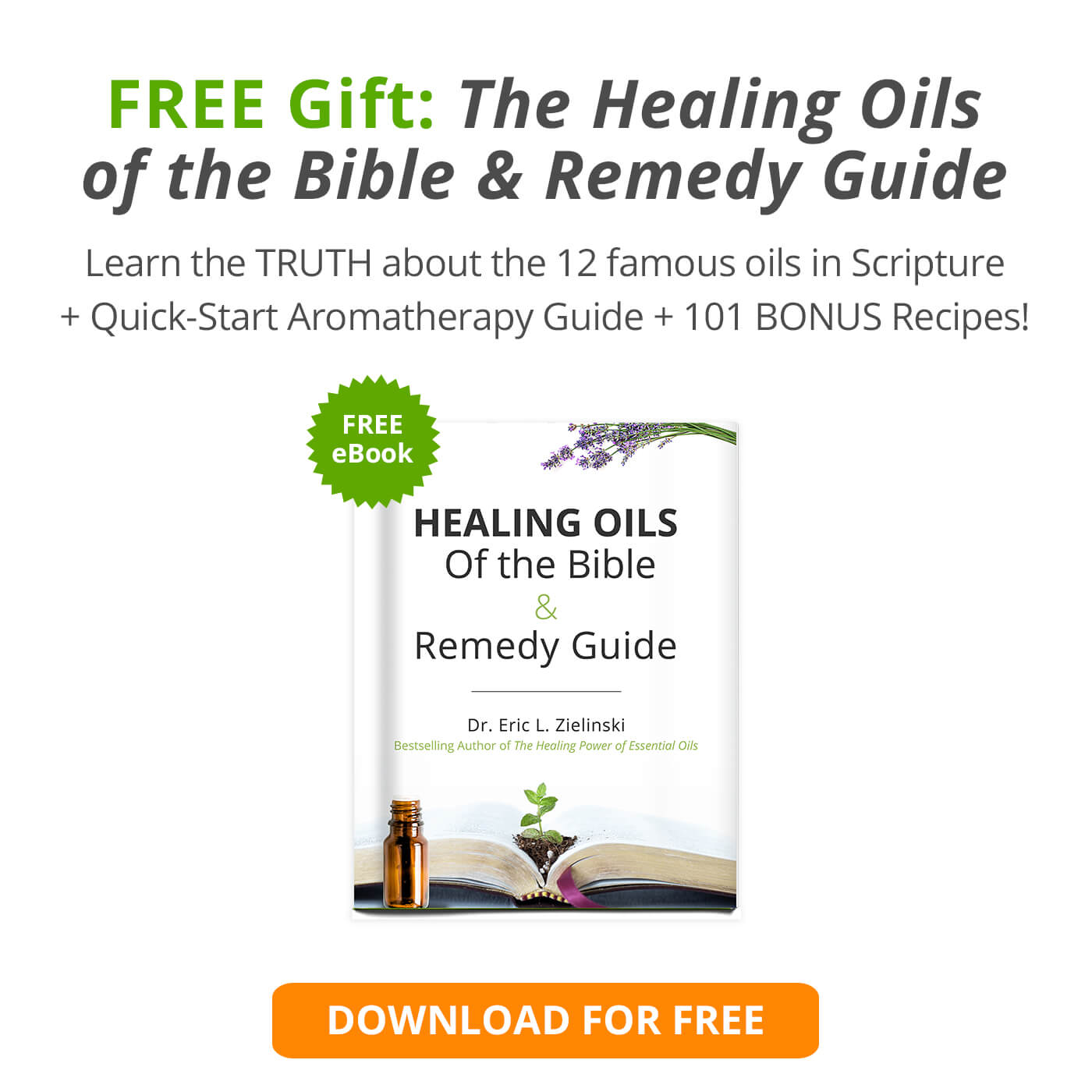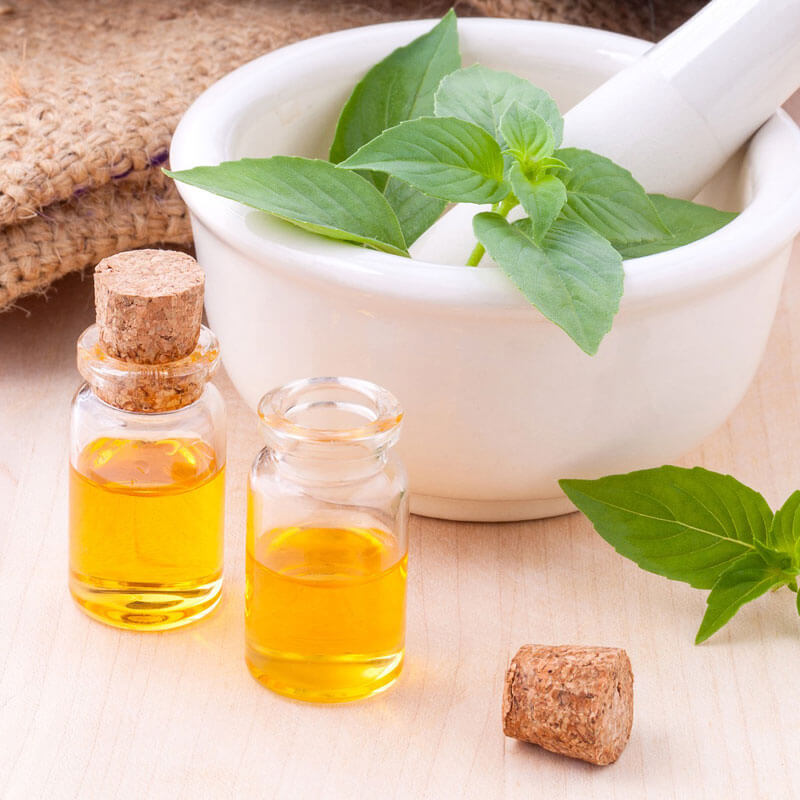When we say you are what you eat, it’s not just a quip or playful admonition. What enters your digestive system quite literally shapes your gut health. The digestive tract is a center of nutrition, of course, but also immunity and even neural processes. If the intestinal tract is faltering, the whole body suffers.
So, when we say that essential oils are good for gut health, it means they are good for whole-body health, by proxy.
The tides of natural health could not have turned toward natural health at a more important time in our cultural history. Everything about our society is moving us further away from optimal health, shifting the balance of bacteria toward processed foods, dangerous antibiotic-resistant strains, and damaging our bodies from the inside out.
Protecting the core of our body is paramount to natural health, and essential oils are a key partner.
Table of Contents
Gut Health is The Cornerstone of Wellness
Raised on the belief that microbes are inherently bad, with products that proudly claim to kill “99.9%” of bacteria, our society seems to struggle with the idea that bacteria can be – and usually are – good for you. We house bacteria on our skin and all throughout our bodies. In fact, the NIH Human Microbiome Project has proven that the human body actually contains trillions of microorganisms; literally outnumbering human cells 10 to 1! And what most people don’t realize is that a major hub of microbial focus is in the gut.
It’s important to understand that bacteria are most frequently our allies, because the way we approach bacteria ultimately determines how successful our attempts at wellness can be. Without beneficial bacteria to balance the deleterious strains, we are susceptible to intestinal damage, illness, mental and emotional stress, and so much more.
Be sure you don’t discount the importance of gut health because it is responsible for a vast majority of your immune function! From a seminal 2008 report:
The gastrointestinal system plays a central role in immune system homeostasis. It is the main route of contact with the external environment and is overloaded every day with external stimuli, sometimes dangerous as pathogens (bacteria, protozoa, fungi, viruses) or toxic substances, in other cases very useful as food or commensal flora. The crucial position of the gastrointestinal system is testified by the huge amount of immune cells that reside within it.
Indeed, gut-associated lymphoid tissue (GALT) is the prominent part of mucosal-associated lymphoid tissue (MALT) and represents almost 70% of the entire immune system; moreover, about 80% of plasma cells [mainly immunoglobulin A (IgA)-bearing cells] reside in GALT. GALT interacts strictly with gastrointestinal functions in a dynamic manner; for instance, by increasing intestinal permeability in replay to particular stimulations, or orientating the immune response towards luminal content, allowing either tolerance or elimination/degradation of luminal antigens, or sometimes provoking damage to the intestinal mucosa, such as in coeliac disease or food allergy. (1)
The Anti-bacterial Problem That Hurts Gut Health
Before we dive into the Top 6 Essential Oils for Gut Health, we need to address the elephant in the room: our obsession with being “clean” and killing bacteria.
There is certainly a time and a place for antibacterial effects and even antibiotics. In fact, there are essential oils that carry these actions. Sound like a contradiction? It’s not. It’s not the act of eliminating a bacteria that’s the concern; it’s the lifestyle of being anti bacterial.
When we are anti-bacterial and out to destroy it haphazardly, we miss the mark in a big way.
Yet, we are interrupting healthy bacterial growth in every phase of life. Babies are increasingly born via C-section, which bypasses the mother’s birth canal and loses valuable transfers of beneficial bacteria from mother to baby. (2)
In childhood, children are plastered with antibacterial hand sanitizers while parents scrub the house with antibacterial wipes and sprays – all the while killing weaker bacterial strains and allowing the more dominant to resist the component and live on.
As young adults, we often become a little to free with “junk” foods, damaging beneficial intestinal bacteria. As older adults, we’ve spent a lifetime damaging and otherwise eliminating bacteria, and the effects begin to surface as GERD, leaky gut, IBS, and more.
Healing the gut is a topic to come, but for now let’s work to overcome the struggles that we’ve created for ourselves in this dangerously hygienic world!
Holistic Gut Health Solutions
With a shift in focus away from eliminating dangerous bacteria and toward strengthening good bacteria, holistic options are available to us.
Holistic refers to the body as a whole, which means we can take those first baby steps toward wellness from any area of our lives. Diet is a primary concern, improving the gut directly via the substances that come in contact with it – particularly in light of many meat sources relying on gross misuse of antibiotics that may be retained in the meat itself. (3) Cleaning supplies that do not harshly eliminate beneficial bacteria are also important, as well.
Believe it or not, even stress plays a role in gut health. A Harvard educational article describes this phenomenon as the “brain-gut axis,” explaining,
The enteric nervous system is sometimes referred to as a “second brain” because it relies on the same types of neurons and neurotransmitters that are found in the central nervous system (brain and spinal cord)… researchers are interested in understanding how psychological or social stress might cause digestive problems. (4)
Essential oils, if you haven’t heard, can meet each of these needs – from improving the intestinal tract directly to cleaning up our cleaning products to relieving stress. If you’re ready to be good to your gut, get these oils:
Each of their preparations and actions are different, but the overarching effects spell wellness for the gut. Here are some of the best ways to use these essential oils for gut health.
Top 6 Essential Oils for Gut Health
- Thyme & Rose – In a study released earlier this year, researchers found that the primary constituents of thyme and rose oil – thymol and geraniol, respectively – “could be effective in suppressing pathogens in the small intestine, with no concern for beneficial commensal colonic bacteria in the distal gut.” (5)
- Cardamom – Both anti-inflammatory and antispasmodic, cardamom is a soothing oil related to the ginger family. It has been associated with many digestive health benefits, including gastroprotective effects. (6)
- Peppermint – Cool and soothing, peppermint oil has been shown to improve IBS, one of the most common disruptors for gut health, when taken in a professional grade, enteric coated, commercial supplement. (7)
- Clove – As an oil with some of the most eugenol, clove is an efficient antimicrobial that can counter Candida albicans overgrowth. Its effects against the yeast are effective to the point that an over the counter internal preparation is being studied using clove oil. (8)
- Tea Tree & Oregano – A powerful duo, tea tree and oregano essential oils are the case-in-point for antibacterial as a beneficial component, compared against harsher, synthetic or toxic antibacterials. Use in DIY cleaners to help stop the spread of viral illnesses without attempting to bleach away the good with the bad.
- Fennel – Used as a digestive stimulant in whole-herb form, the essential oil retains some of the soothing components for the gut as an anti-spasmodic, likely connected to the estragole content. (9) This component is also found in fennel. Aromatherapy and diluted topical use are very popular, but since estragole has been monitored for potential toxicity internally some recommend against ingesting it.
BONUS: Not making the Top 6 Essential Oils for Gut Health list, don’t forget about Tarragon. It’s still a super healing oil that promotes gut health as well!
When to Use Essential Oil for Gut Health
Now that we’ve talked about essential oils for gut health and oils that can help to heal the gut, we can walk through ways to use DIY essential oil blends for digestive issues. There are dozens of oils and countless blends out there, but a few are especially beneficial for the gut, with several approaches for application and use.
An essential oil is the “volatile” component of the plant, meaning they are released quickly and evaporate just as fast. This little botany tidbit can help you remember that they work especially well for quick results situations.
In other words, most essential oils are helpful for fast-acting results, such as symptom relief and antimicrobial effects.
This kind of effect matches well with gut health concerns and is amplified as part of a multipronged approach to healing the gut. Diet and lifestyle changes are imperative, and it’s often worth working with a holistic healthcare professional to maximize your natural efforts using essential oils.
Taking a Whole-Body Approach
As we walk through some of the uses for essential oils and gut health, it’s important to remember that you can integrate the essential oils into your whole-body approach to wellness. Suggesting a DIY essential oil protocol or preparation does not exclude other steps toward health and healing.
For gut health in particular, a DIY essential oil blend will pair very well with probiotics, an absolutely vital component of intestinal healing and balance. (1) They are also often used alongside digestive enzymes to maximize digestion improvement. An excellent example of early research on the combination comes with lab testing, where animals showed decreased intestinal inflammation with thymol and cinnamaldehyde essential oil components combined with the enzymes xylanase and beta-glucanase. (2)
3 Application Tips
The DIY Essential Oil Protocol for Gut Health includes evidence-based & traditional techniques to counteract concerns like nausea, GERD, IBS and more! EOs can be used in numerous ways, varying based on the oil, individual, concern, and even preference. Here are some ways to use essential oils for improved gut health.
1. Internal Use
Use capsules when you need the oil to make it to the stomach rather than the mucous membranes of the esophagus. If the oil is specifically for the intestines, enteric coated capsules are necessary, which you can find, but they can be pricey.
The important thing to remember for capsule creation is that the oils should still be diluted as an extra precaution, and that the capsule shouldn’t be filled only with the DIY essential oil blend for gut health. You still only need 2-3 drops at a time, so most of the capsule should be comprised of the carrier oil. Very small capsules are best.
Note: Internal, medicinal use of oils should be executed in proper dosing, with knowledge of contraindications and safe usage. Seek guidance or further education before creating and using capsules, or use a pre-formulated, pre-dosed essential oil supplement.
- Optimal oils for capsule use: peppermint, clove, ginger, oregano, tea tree, thyme. (Choose 2-3 oils at a time, and mix up protocol every couple weeks).
- Optimal situations for capsule use: indigestion, nausea, IBS, GERD, dysbiosis, with supervision by an integrative care professional. (Note: Peppermint oil could make GERD worse and is not recommended for this specific condition.)
- Carrier oil options: coconut, almond, sesame, apricot kernel, avocado, castor, evening primrose, jojoba, sunflower, pumpkin seed, neem, hemp seed, hazelnut, borage seed.
2. Topical Use
The soothing effects of aromatherapy are translated well into massages, and an upset tummy can be eased with a topical application. If you keep a diluted blend or two on hand, you can quickly grab it and apply when needed.
Dilute oils to 1-3% of the total volume into a carrier oil of your choice. Favorites include coconut oil, almond oil, jojoba, and avocado oil. Do remember that if the coconut oil is exposed to temperatures below the mid-seventies, it will solidify. Fractionated coconut oil is an option if you’d like it to remain liquid and other carriers are unavailable.
- Optimal oils for topical use: peppermint, ginger, caraway, coriander, *fennel, anise, tarragon, thyme, or citrus.
- Optimal situations for topical use: indigestion, constipation, stomach aches, and nausea.
- Word of Caution: *Fennel oil (Foeniculum vulgare) contains the estrogenic compound Trans Anethole. (3) This raises obvious concerns for people with estrogen dominance and estrogen positive cancer. Also, “estragole, a main component of vulgare has become a cause of concern, as the structurally similar methyleugenol has been recently found to be a potential carcinogen. This has led to the European Union (EU) to allow a new legal limit for estragole of 10 mg/kg in non-alcoholic beverages.” (4)
3. Inhalation
Don’t let a pretty scent fool you! Aromatherapy is powerful, transferring the oil’s composition to your body simply by inhaling it. Inhalation is actually one of, if not the most, effective ways to administer the benefits of essential oils.
We are most familiar with diffusion, but DIY essential oils for digestive health can be inhaled much more directly for the person who is experiencing tummy trouble or gut concerns. A couple of drops in a bowl of hot water becomes an instant personal steamer if you “tent” a towel over and inhale. Jewelry or clothing can hold a drop or two for a more lasting personal source to inhale, and aroma sticks can fit in pockets or purses for easy, portable access. The easiest method? Simply open the bottle and sniff!
- Optimal oils for inhalation: citrus, ginger, fennel, peppermint, clove, cinnamon…or any!
- Optimal situations for inhalation: nausea, stomach ache.
(Note: It is recommended to avoid hot oils like cinnamon and clove in steam inhalations so as not to irritate the sinus passages.)
Helpful Blends & Recipes
Now that you have a good idea of your options, you can start to connect them for overall health and wellness. Blending the oils first into a carrier oil or honey will ensure proper dispersion and dilution, creating a safer and more effective remedy. For internal use, culinary or otherwise, a pure, organic essential oil is ideal.
Healthy Digestion Blend
- Choose a few of the following, and blend a total of 20 drops into 10 ml honey and carrier oil (coconut is my favorite): clove, orange, cinnamon, rosemary, eucalyptus, lemon. Stir 2 drops of this diluted blend into tea or water, or take directly.
- Add a drop or two of the following organic essential oils as replacements in culinary preparations: ginger, fennel, dill, coriander, cardamom, cinnamon, citrus, thyme, clove, etc.
Nausea Blend
- Blend 3 drops ginger and 2 drops lemon and diffuse. You could also blend the same number of drops into 10 ml carrier oil and apply topically.
- Blend 3 drops peppermint and 2 drops ginger and diffuse. You could also blend the same number of drops into 10 ml carrier oil and apply topically.
Tummy Trouble Blend
- Choose a few of the following, and blend a total of 5 drops into 10ml carrier oil: cardamom, peppermint, tea tree, ginger, caraway, coriander, or fennel. Inhale or use topically.
- Blend one drop of peppermint in 1 tsp of honey and consume for soothed and improved digestion, or create capsules replacing the honey with carrier oil.
A working knowledge of DIY essential oil blends can be a valuable ally in times of digestive upset. Take the time to learn about each of these oils thoroughly so that you can add them to your at-home DIY essential oil medicine cabinet and begin to heal your gut.
- http://www.hindawi.com/journals/grp/2012/457150/
- http://www.ncbi.nlm.nih.gov/pubmed/25275341
- http://www.ncbi.nlm.nih.gov/pubmed/12818366
- http://www.sciencedirect.com/science/article/pii/S1878535212000792
- https://pubmed.ncbi.nlm.nih.gov/25500493/
- https://academic.oup.com/jn/article/138/9/1796S/4750859
- https://www.nytimes.com/2013/03/28/opinion/antibiotics-and-the-meat-we-eat.html?_r=2
- https://www.health.harvard.edu/newsletter_article/stress-and-the-sensitive-gut
- https://www.ncbi.nlm.nih.gov/pubmed/25500493
- https://www.ncbi.nlm.nih.gov/pubmed/16298093
- https://www.ncbi.nlm.nih.gov/pubmed/9430014
- https://www.ncbi.nlm.nih.gov/pubmed/26170621
- https://www.ncbi.nlm.nih.gov/pubmed/26434144








